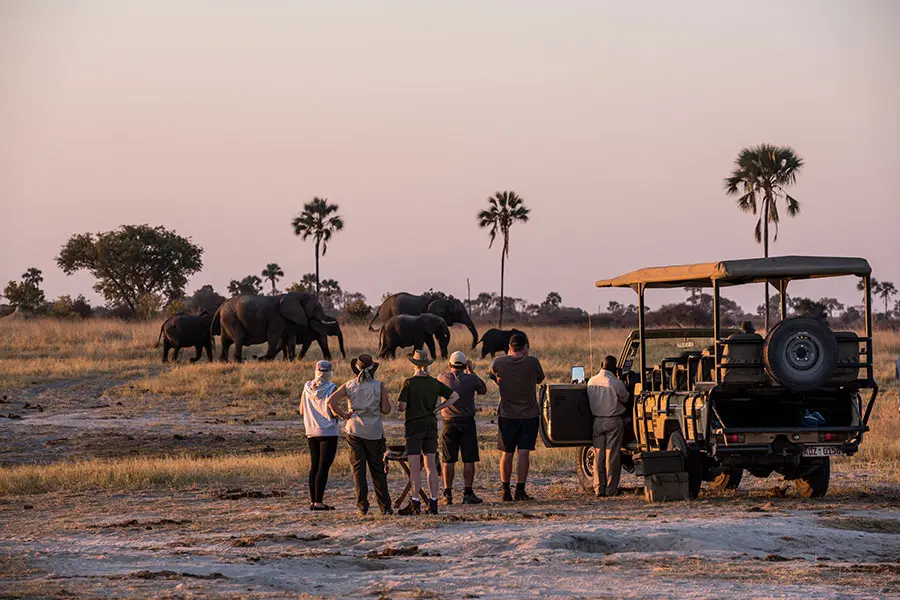Language
- English
- Español
Currency
- AUD Australian Dollar
- CAD Canadian Dollar
- EUR Euro
- GBP Pound Sterling
- USD US Dollar
- ZAR Rand

costs
With so many potential draw cards from the likes of UNESCO World Heritage Sites and one of the 7 Natural Wonders of the World, Victoria Falls, it's no wonder Zimbabwe has become a famed safari destination. But what truly makes a safari in Zimbabwe exceptional is its diversity – from water-based activities, adrenaline-inducing adventures, lauded safari destinations, and even hidden gems tucked away in the wilderness.
Explore Zimbabwe's flagship reserve, Hwange National Park, popular Mana Pools National Park, and encounter elephants at Chobe National Park for the safari side of things. As far as adventures go, Victoria Falls has you covered, or the wonderful Lake Kariba, where relaxation and tranquillity beckon. But before you start planning your greatest adventure, let's break down what a safari in Zimbabwe might look like and the costs associated with it:
Zimbabwe is full of wonderful safari excursions, all of which vary in cost. Fortunately, with a great array of options, there is something for both first-time and returning travellers. The cost of your safari will very much depend on the type of accommodation booked, activities, and also transport choices. Make a selection from the best places to visit in Zimbabwe and decide what type of safari you're interested in – here are a few options:
As with any holiday, what you choose to do and where you go will impact the general cost of your safari. The table below breaks down costs for Zimbabwe safaris calculated per person per night, sharing in both low and high season:
| Mid-Range | Luxury | 5-Star | |||
|---|---|---|---|---|---|
| Low | High | Low | High | Low | High |
| $1,000 pps* | $1,500 pps* | $1,000 pps* | $1,700 pps* | $1,700 pps* | $2,000 pps* |
* Please note: all the costs are guidelines only and an average for per person, per night, sharing a room in High and Low Season. They exclude international flights, visas and optional activities. Note that conservation fees, levies and permits are all subject to change. Peak or High Season generally runs over Christmas and New Year, and from about July to October.

As with most safari destinations, Zimbabwe accommodation varies from comfortable camps and lodges to more premium and exclusive options. What you choose, and how accessible it is, will have an impact on the cost associated with your overall safari. Have a look at the table below for costs calculated per person per night, sharing during both high and low season.
| 4-star comfort | 4-star luxury | 5-star luxury | |||
|---|---|---|---|---|---|
| Low | High | Low | High | Low | High |
| $550 pps* | $850 pps* | $800 pps* | $1,200 pps* | $1,500 pps* | $2,000 pps* |
* Please note: all the costs are guidelines only and an average for per person, per night, sharing a room in High and Low Season. They exclude international flights, visas and optional activities. Note that conservation fees, levies and permits are all subject to change. Peak or High Season generally runs over Christmas and New Year, and from about July to October.
While the usual phrasing talks to location, safaris are all about timing, timing, timing. When you choose to visit Zimbabwe will dictate the final cost of your holiday. The good news is that Zimbabwe’s variety of beautiful landscapes makes it a fantastic year-round destination.
May to October is considered the best time to visit Zimbabwe. Being the country’s peak season, also known as the dry winter season, the milder temperatures, rain-free conditions, and low malaria risk make it ideal for a safari filled with exceptional game viewing. With peak season, however, comes a higher price tag as there’s an increase in demand and more footfall, with accommodations and flights selling out in advance.
Zimbabwe’s green season, or wet season, typically runs from November to March and brings with it a lush, vibrant landscape, dense vegetation, and lots of rain! Because of the season’s less-desirable weather, this period of travel is not as favoured by visitors, causing costs to drop, resulting in fewer crowds, special deals on accommodation and flights, and value-adds (free nights, discounts, and upgrades).
If you’re hoping to visit Victoria Falls, in particular, then April and May are your best bets. The Falls are in full flood and offer the most spectacular views.
It's important to note that ‘all-inclusive' may not be as comprehensive as you first expect. In Africa, and on safaris, that can mean a range of things, and it's always worth clarifying what is not included. One of the first things to do is consult our blog on visa-free African countries for US citizens, as that may tick off one of the boxes regarding associated costs already. What possible additional costs could you come across? Have a look at our list below:
Should you wish to plan your next great adventure with the help and guidance of one of our Africa Safari Experts, they will be able to advise you on all of the above and ensure each of your transfers is organised ahead of time and occurs as seamlessly as possible – just remember, in travelling, anything can happen and sometimes delays are unavoidable.
Help Me Plan